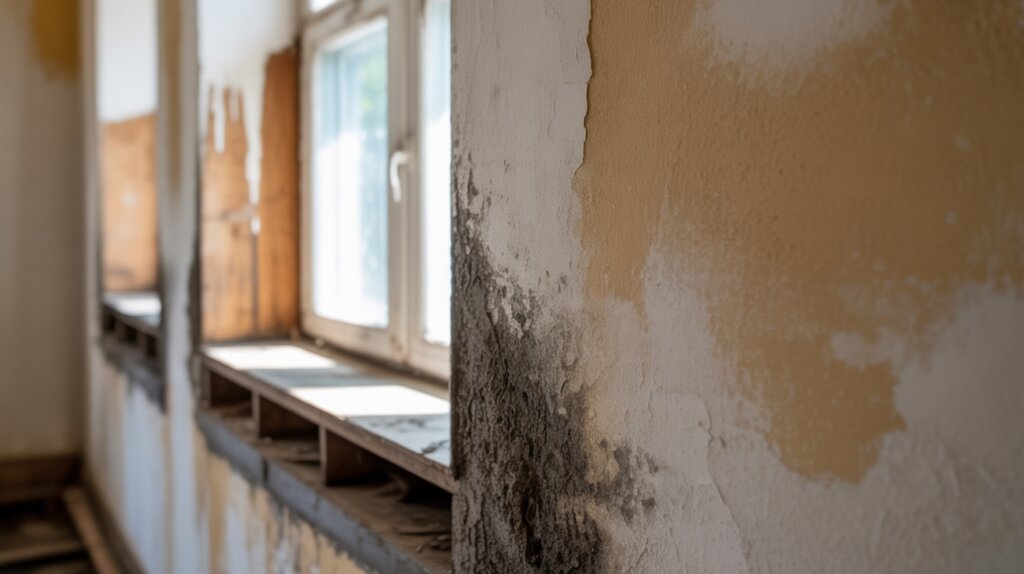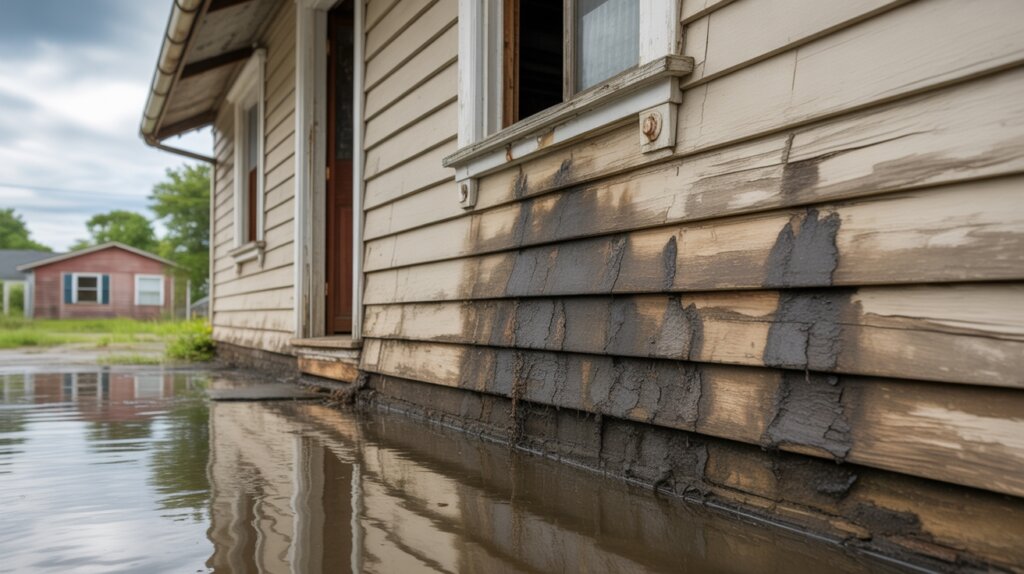Selling a house with water damage can be stressful. Many homeowners worry about legal problems if they do not handle things right. Buyers want to know about any damage before they agree to buy.
If you hide water damage or fail to report it, you could face serious trouble. Lawsuits, fines, and even canceled sales are real risks. Mistakes in disclosure can cost you thousands of dollars.
You must tell buyers about any water damage, repairs, or leaks to protect yourself legally. There are clear steps you can take to avoid problems.
Honesty and clear paperwork are your best tools. This blog will show you how to protect yourself when selling a house with water damage.
Key Takeaways
- Sellers must fully disclose all known water damage, leaks, mold, and repairs to buyers before the sale.
- Failure to disclose water damage can lead to lawsuits, contract rescission, fines, and other legal penalties.
- Professional inspection reports and documentation of repairs are crucial for legal compliance and dispute prevention.
- Federal and state laws require disclosure of specific hazards, such as mold and lead-based paint, especially in older homes.
- Sellers are not required to fix all water damage but must honestly disclose any known issues and provide repair documentation.
Understanding Water Damage and Its Risks

Water damage can cause major problems when selling a house. It can harm the building’s structure and lead to legal trouble for the seller. If water gets inside, it may weaken the foundation, rot wood, and cause mold.
Ensuring a clear title includes identifying and resolving any water damage issues that could affect ownership rights. Water damage threatens a home’s structure, invites costly repairs, and can cause serious legal issues for sellers during a sale.
These problems lower the home’s value and can make people sick. Courts may hold sellers responsible if they do not mention water issues. For example, a seller in Florida was found liable for not disclosing water damage (*Johnson v. Davis*, 480 So.2d 625, Fla. 1985).
If you ignore water leaks, more damage and legal issues may follow. You should check for any signs of water coming in. If you find problems, fix them before putting the house up for sale. Conducting a thorough property inspection can help identify hidden water damage and prevent future legal disputes.
Making repairs helps you follow property laws and protects both you and future buyers. Proper maintenance is important for a safe and valuable home.
State Disclosure Laws for Water Damage
Most states require home sellers to tell buyers about any water damage. Sellers cannot hide past leaks, flooding, or repairs. State laws, such as those in California and Texas, make this a legal obligation. Using a home value estimator can help determine if recent repairs have affected the home’s worth. If a seller does not disclose water damage, the buyer may sue or cancel the sale.
Sellers must keep records of all water incidents and repairs. Repair cost estimates should be accurate and included in documentation. States often have special forms for disclosing water problems. These forms ask for details about the damage and repairs. Proper documentation of these issues reduces legal risks and helps buyers make good choices. Being honest about water damage promotes transparency and can prevent future disputes.
Federal Regulations Affecting Home Sales

Federal regulations can affect how you sell your home. Some rules protect buyers from environmental hazards caused by water damage. Sellers must follow these rules to avoid legal problems. Federal rules protect homebuyers from hazards like water damage, so sellers must comply to prevent legal trouble during the sale.
The Environmental Protection Agency (EPA) sets rules about mold and lead-based paint. Mold and lead can come from water damage. If your home was built before 1978, you must tell buyers about any lead paint.
The Residential Lead-Based Paint Hazard Reduction Act requires sellers to give specific lead paint information. Buyers must get this information before closing. Not doing so can delay or stop the sale.
The National Flood Insurance Program (NFIP) affects homes in flood zones. Homes in these areas usually need flood insurance. Lenders often require this before giving out federally backed loans.
Ignoring these requirements can lead to legal complications, which may jeopardize your sale. Understanding these federal rules helps you avoid delays. Following them makes the transaction smoother for everyone.
Required Seller Disclosure Forms
You must complete state-mandated disclosure forms, which typically require you to report any known water damage or related repairs under statutes like Cal. Civ. Code § 1102 in California. Failing to disclose or omitting details about past water issues is a common error that can expose you to liability for misrepresentation or fraud.
It’s essential to understand your state’s specific requirements to ensure full compliance and avoid legal disputes. Proper home inspection procedures can help identify hidden issues that should be disclosed. Additionally, understanding the probate process can be important if the property is inherited, as it influences the transfer and sale responsibilities.
State Disclosure Requirements
States use disclosure laws to make real estate transactions transparent when water damage is involved. Most states require sellers to report any known water damage. Sellers must usually use a state-approved form to answer questions about the property.
If you do not disclose water issues, you could face legal problems. Always check with a lawyer if you are unsure about your duties. Your liability insurance may also help with legal disputes over disclosures.
States may follow laws like the Uniform Property Condition Disclosure Act. Most rules require sellers to report any water damage, leaks, or flooding. Sellers often must share details about repairs, insurance claims, and provide any inspection reports.
Honest and complete disclosure is your legal responsibility as a seller. Following these rules helps protect you from future disputes. If you are unsure, it is best to seek legal advice.
Common Disclosure Mistakes
State-approved disclosure forms help you understand what you must share when selling a home. Sellers often make mistakes, especially about water damage. Mistakes can lead to legal problems.
Many sellers forget to mention old leaks or past repairs. If you fixed something yourself, you still need to report it. The law requires you to reveal any known defects.
You must tell buyers about basement floods, roof leaks, or any repairs related to water. Leaving out these details can lead to claims of fraud or misrepresentation. If you are unsure, it is better to share more information.
Incomplete or wrong forms can cancel the sale. They might also cause expensive lawsuits. Always check your form for accuracy before submitting.
Identifying the Source and Extent of Water Damage

To identify water damage, you must find both the source and how much damage there is. Water can enter from plumbing leaks, roof problems, or cracks in the foundation. If you fail to check carefully, you might miss important details.
You should look for clear signs like stains, warped surfaces, and mold growth. Each sign helps show where water is coming in. If you see these, further investigation is needed. Watch for stains, warped areas, or mold—visible clues that water intrusion may be present and further inspection is required.
Tracing the problem back to its source is important for proper repairs. This could be a broken pipe or a damaged roof. If you skip this step, repairs may not solve the real issue.
You must also measure how far the damage has spread. This helps you know what repairs are necessary. If you do not do this, you may not meet your legal disclosure obligations.
Additionally, understanding how water damage affects the structural integrity of the home is crucial, as it can compromise the safety and stability of the property over time. Recognizing the extent of damage is essential for accurate repair estimates and legal compliance.
If you find water damage, you have a duty to report it honestly. California Civil Code §1102 requires full disclosure. Failing to disclose or misjudging the problem could make you legally responsible.
Professional Inspections and Documentation
A professional inspection is important after you find water damage. Inspectors use special tools to check for hidden moisture or mold. Their reports serve as legal proof if you ever face claims or questions later. Step-up in basis can affect the tax implications of property sales, so thorough documentation is crucial. If you skip inspection, you may miss serious problems. Incomplete testing could hide mold and lead to health risks.
Missing paperwork can make you vulnerable to lawsuits from buyers. Proper documentation supports a smooth sale. Full transparency protects you under state disclosure laws like Cal. Civ. Code § 1102. Liens and title issues can also complicate sales, making thorough documentation even more important. Good records give you peace of mind and help prevent future disputes.
Repair Obligations Versus Selling As-Is
You must decide whether to repair water damage or sell your house “as-is.” California law does not require you to fix every problem. However, you must tell buyers about any known water damage. Making repairs can help attract more buyers and get higher offers. Selling the house “as-is” may be quicker but could lower your sale price. In both cases, you must fully disclose all water damage.
Full disclosure can protect you from legal problems later. If you hide defects, buyers may sue you after the sale. Consider your choices carefully before deciding how to sell. Additionally, opting for an as-is sale with a quick cash buyer can streamline the process and reduce the stress of repairs and negotiations. Being aware of title issues and how to handle them can also influence your sale strategy and protect you legally.
Working With Real Estate Agents
When you partner with a real estate agent, they’re legally required under statutes like the Real Estate Settlement Procedures Act (RESPA) to disclose known water damage to potential buyers. You can work closely with your agent to negotiate repair credits or other concessions, ensuring compliance with state disclosure laws.
Additionally, you’ll need to adjust your marketing strategy to address the property’s condition transparently and mitigate possible liability. Furthermore, understanding the importance of accurate property valuation can help you set realistic expectations and avoid pricing issues that might arise from concealed water damage.
Agent Disclosure Obligations
Real estate agents must tell buyers about any water damage they know about. This rule applies even if the water damage was fixed. State laws, like California Civil Code §1102, require full disclosure no matter how minor the damage seems.
Agents must give this information before buyers make an offer. If you disclose late, the contract could become invalid. Accurate and timely information helps avoid legal problems.
You should not believe myths that minor water issues do not need reporting. If you hide water damage, you risk lawsuits and penalties. Buyers may also lose trust if they learn about undisclosed damage.
Negotiating Repair Credits
Buyers often ask for repair credits after learning about water damage. Homeowners must handle these requests honestly and follow state disclosure laws. If you do not, you could face legal problems later.
Work with your real estate agent to get repair estimates from licensed contractors. These estimates help you decide on a fair credit amount. Documented estimates also show you are acting responsibly.
Buyers may want credits equal to the repair costs or a lower sale price. Your agent can compare similar sales in your area to guide negotiations. Quick and clear communication helps prevent future disputes.
Marketing Strategies Adjustments
When selling a house with water damage, you must change your marketing approach. Clear and honest communication is required by law. Always follow local disclosure rules like California Civil Code § 1102.
Your real estate agent should know these rules well. If you skip disclosures, you could face legal trouble. Agents can help you share the right details with buyers.
Sellers should show any repairs or warranties in their ads. If the home may interest investors, use ads that target them. Each listing must clearly mention any known water damage.
If you add property details online or in print, stay honest and clear. Always highlight what you have fixed. Agents can help you write descriptions that follow all laws.
Communicating With Potential Buyers
When selling a house with water damage, you must give clear and truthful details to buyers. State laws require you to share this information. Honest disclosure helps avoid legal trouble. Sellers must clearly disclose any water damage to buyers, as required by state law, to prevent legal issues down the line.
You should explain where the water damage came from and how bad it was. If you made repairs, you must mention what was done. Buyers need this information to decide if the house is right for them.
Some loans, like FHA or VA loans, may not allow homes with certain types of damage. If buyers know about repairs and risks, they can plan better. Written records of your disclosures will protect you.
If you fail to disclose important facts, you could face legal action later. Proper communication also builds trust with buyers. Always follow real estate laws in your state. Additionally, providing reasonable and accurate pricing can help facilitate a smoother sale process.
Legal Consequences of Non-Disclosure
If you fail to meet your seller disclosure requirements regarding water damage, you expose yourself to significant legal risks, including potential lawsuits for fraud or misrepresentation. Many states enforce specific disclosure laws, such as California Civil Code § 1102, which mandate full transparency about property defects. Ignoring these statutes can result in financial liability, contract rescission, and even punitive damages.
Seller Disclosure Requirements
You must follow strict disclosure rules when selling a home with water damage. Most states require you to tell buyers about any known water issues. If you do not disclose these problems, you could face legal trouble.
The law usually says you must list all visible water damage, like stains or mold. Past repairs for leaks or floods also need to be shared. If you have repair cost estimates, you should provide them.
If you follow these rules, buyers can make informed choices about the home. For exact details, check your state’s laws, such as California Civil Code §1102 or Texas Property Code §5.008. Each state may have different requirements for sellers.
Potential Lawsuit Risks
If you do not tell buyers about known water damage, you risk being sued. Buyers can take legal action if they find hidden problems after the sale. Courts often side with buyers if you hid important facts.
You could be found guilty of fraud, misrepresentation, or breaking your contract. If this happens, you may have to pay for repairs or lower property value. Sometimes, courts also award extra damages to the buyer.
Insurance may not cover claims if you hid the damage on purpose. You could be left paying all costs and legal fees yourself. If you face a lawsuit, a lawyer can help you understand your options.
Cases like *Johnson v. Davis* show that courts protect buyers in such situations. Legal advice is important if you are accused of hiding water damage. A lawyer can help you settle or fight these claims.
State-Specific Disclosure Laws
Real estate disclosure laws are different in each state. You need to know your state’s rules for reporting water damage. If you do not follow these laws, you may face legal or financial problems.
Some states, like California, require you to write down any water damage or mold repairs. In Texas, sellers must fill out forms that ask about water leaks and mold. Buyers can cancel a sale or sue if you do not tell the truth.
You might have to show proof of water damage repairs. Mold removal must also be shared with buyers in many places. If your disclosure is false or incomplete, you can be fined or taken to court.
Always read your state’s real estate laws before selling. A real estate lawyer can help you follow the rules. This protects you and helps avoid future disputes.
Negotiating Repairs or Credits With Buyers
You and the buyer must agree on how to fix water damage before closing. Usually, you can either repair the damage or give the buyer a credit. California law requires you to disclose all known water damage.
If you choose to repair, hire licensed contractors and keep all receipts. Proper documentation helps protect you from future problems. Make sure the repairs meet agreed standards.
A credit gives the buyer money at closing to handle repairs themselves. Buyers may request a price reduction or repairs after an inspection or appraisal. Put all agreements in writing to follow real estate contract rules.
Insurance Considerations for Water Damage
You must promptly disclose any water damage to your insurance provider, as failure to do so can violate policy terms and state law (see Cal. Ins. Code § 332). Review your policy’s coverage limitations, since most standard homeowners’ insurance excludes gradual water damage and may restrict claims for pre-existing issues. To protect your interests, follow the insurer’s claim process precisely, including timely documentation and cooperation during inspections.
Disclosure to Insurance Providers
You must tell your insurance provider about any water damage when selling a house. Most states and insurance policies require full disclosure. If you do not disclose, you could lose coverage or have claims denied.
The insurance company uses your information to assess risks and set policy terms. State laws, like California Insurance Code Section 332, require you to share all important facts. If you hide water damage, you may break the law.
Disclosing water damage can protect your right to make future claims. Honest information also helps inspectors do their job well. If buyers later find hidden damage, you could face legal trouble.
Coverage Limitations Explained
Homeowners insurance does not cover all types of water damage. Most policies only pay for sudden, accidental water events like a burst pipe. Damage from slow leaks, flooding, or poor upkeep is usually not covered.
Insurance companies often reject claims for old or neglected problems. If you do not know your policy’s limits, you may face high repair bills. Disputes can also come up if you fail to disclose uncovered damage when selling your home.
You should always read your insurance policy’s exclusions and limits. If you do not understand them, ask your agent for help. Knowing your coverage can protect you from unexpected costs or legal trouble.
Claim Process Steps
The claim process has legal steps you must follow if your house has water damage. You must tell your insurance company right away. If you do not act quickly, you may break your policy or state laws.
You should keep copies of all emails, letters, or calls with your insurer. A professional inspection may be needed, and you must cooperate. If you do not provide information, your claim could be denied.
You must also tell buyers about any water damage and the claim you filed. California law requires full disclosure when selling a home. If you hide damage or give false information, you could face legal trouble.
Special Considerations for Mold and Health Concerns
Mold from water damage can cause health problems and legal issues. You must fix mold problems before selling your home. Mold can lead to breathing issues and allergies.
Most states require you to tell buyers about any known mold. For example, California law says you must disclose mold problems. Hiding mold or just painting over it is not enough.
You should hire certified experts to remove mold completely. Professionals will clean or replace any affected materials. If you skip proper mold removal, you risk being sued after the sale.
Protecting Yourself With Proper Documentation
Proper documentation protects you when selling a house with water damage. You should keep clear records of all repairs and inspections. If you have good records, you can avoid legal trouble later.
You must save every home inspection report and receipt from repair companies. These documents show that you acted responsibly and followed the law. You may also need copies of emails or letters with buyers and contractors.
If someone questions your actions, you can show your paperwork as proof. Courts often trust sellers who have solid evidence. Make sure all your records are easy to find during the sale.
Conclusion
If you plan to sell a house with water damage, you must follow the law. California requires you to disclose all known issues to buyers. If you fail to do this, you could face legal problems later.
If you want a simple and fast sale, we buy houses for cash in any condition. This can save you time and effort, especially when dealing with repairs or disclosures. You do not have to worry about hidden problems or long negotiations.
If you need to sell your house quickly and easily, let us help. We at Greg Buys Houses are ready to give you a fair cash offer today. Contact us now to start your easy home-selling process.

